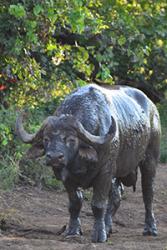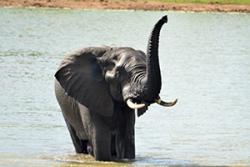Global decline of large herbivores may lead to an “empty landscape,” scientists say
 Bull buffalo after a mud wallow.: image credit Gina HaywardThe decline of the world’s large herbivores, especially in Africa and parts of Asia, is raising the specter of an “empty landscape” in some of the most diverse ecosystems on the planet. Many populations of animals such as rhinoceroses, zebras, camels, elephants and tapirs are diminishing or threatened with extinction in grasslands, savannahs, deserts and forests, scientists say.
Bull buffalo after a mud wallow.: image credit Gina HaywardThe decline of the world’s large herbivores, especially in Africa and parts of Asia, is raising the specter of an “empty landscape” in some of the most diverse ecosystems on the planet. Many populations of animals such as rhinoceroses, zebras, camels, elephants and tapirs are diminishing or threatened with extinction in grasslands, savannahs, deserts and forests, scientists say.
An international team of wildlife ecologists led by William Ripple, Oregon State University, with participation from Â鶹Íř, conducted a comprehensive analysis of data on the world’s largest herbivores (over 100 kilograms, or 220 pounds, on average), including endangerment status, key threats and ecological consequences of population decline. They published their observations today in Science Advances, the open-access online journal of Science magazine.
The authors focused on 74 large herbivore species — animals that subsist on vegetation — and conclude that “without radical intervention, large herbivores (and many smaller ones) will continue to disappear from numerous regions with enormous ecological, social, and economic costs.”
Ripple initiated the study after conducting a global analysis of large-carnivore decline, which goes hand-in-hand, he said, with the loss of their herbivore prey. “I expected that habitat change would be the main factor causing the endangerment of large herbivores,” he said. “But surprisingly, the results show that the two main factors in herbivore declines are hunting by humans and habitat change. They are twin threats.”
The scientists refer to an analysis of the decline of animals in tropical forests published in the journal BioScience in 1992. The author, Kent H. Redford, then a post-doctoral researcher at the University of Florida, first used the term “empty forest.” While soaring trees and other vegetation may exist, he wrote, the loss of forest fauna posed a long-term threat to those ecosystems.
 Elephant: Image credit: Gina HaywardRipple and his colleagues went a step further. “Our analysis shows that it goes well beyond forest landscapes," he said, “to savannahs and grasslands and deserts. So we coin a new term, the empty landscape.” As a group, terrestrial herbivores encompass about 4,000 known species and live in many types of ecosystems on every continent except Antarctica.
Elephant: Image credit: Gina HaywardRipple and his colleagues went a step further. “Our analysis shows that it goes well beyond forest landscapes," he said, “to savannahs and grasslands and deserts. So we coin a new term, the empty landscape.” As a group, terrestrial herbivores encompass about 4,000 known species and live in many types of ecosystems on every continent except Antarctica.
The highest numbers of threatened large herbivores live in developing countries, especially Southeast Asia, India and Africa, the scientists report. Only one endangered large herbivore lives in Europe (the European bison), and none are in North America, which, the authors add, has “already lost most of its large mammals” through prehistoric hunting and habitat changes. Co-author, Dr Matt Hayward of Â鶹Íř’s , whose contribution was to identify threats to large herbivores and provide examples of species that have been affected, explains: “25 of the largest wild herbivores now occupy an average of only 19 percent of their historical ranges. Competition from livestock production, which has tripled globally since 1980, has reduced herbivore access to land, forage and water and raised disease transmission risks.”
He adds that: “the UK is currently virtually an empty landscape for large mammals, but this wasn’t always the case. Today, there are plans to remedy this situation with reintroductions of Eurasian beaver, pine marten, Eurasian lynx and wolf currently being proposed or undertaken. Such actions illustrate the UK’s commitment to protecting its natural heritage to developing countries that face a bigger burden of costly interactions with large mammals without the riches to cope as well.”
Meanwhile, herbivore hunting occurs for two major purposes, the authors note: meat consumption and the global trade in animal parts. An estimated 1 billion humans subsist on wild meat, they write. Dr Matt Hayward added: “The market for medicinal uses can be very strong for some body parts, such as rhino horn. Horn sells for more by weight than gold, diamonds or cocaine.” Africa’s western black rhinoceros was declared extinct in 2011.
“The causes of the decline of some large herbivores are difficult to remedy in a world with increasing human populations and consumption,” said co-author Taal Levi, assistant professor in the Oregon State Department of Fisheries and Wildlife. “But it's inconceivable that we allow demand for horns and tusks to drive the extirpation of large herbivores from otherwise suitable habitat. We need to intensify the reduction of demand for such items.”
The loss of large herbivores suggests that other parts of wild ecosystems will diminish, the authors write. The likely consequences include: reduction in food for large carnivores such as lions and tigers; diminished seed dispersal for plants; more frequent and intense wildfires; slower cycling of nutrients from vegetation to the soil; changes in habitat for smaller animals including fish, birds and amphibians.
“We hope this report increases appreciation for the importance of large herbivores in these ecosystems,” said Ripple. “And we hope that policymakers take action to conserve these species.”
To understand the consequences of large herbivore decline, the authors call for a coordinated research effort focusing on threatened species in developing countries. In addition, solutions to the decline of large herbivores need to involve local people. “It is essential that local people be involved in and benefit from the management of protected areas,” they write. “Local community participation in the management of protected areas is highly correlated with protected area policy compliance.”
In addition to Ripple and Levi, co-authors include Christopher Wolf and Luke Painter of Oregon State; Rodolfo Dirzo of Stanford University; Thomas M. Newsome of The University of Sydney in Australia; Kristoffer T. Everatt and Graham I.H. Kerley of Nelson Mandela University in South Africa; Mauro Galetti of the Universisade Estadual Paulista in Brazil; Matt W. Hayward of Nelson Mandela University and Â鶹Íř in the United Kingdom; Peter A. Lindsey of Panthera (nonprofit organization) and the University of Pretoria in South Africa; David W. MacDonald, Yadvinder Malhi and Christopher J. Sandom of the University of Oxford in the United Kingdom; John Terborgh of Duke University; Blaire Van Valkenburgh of UCLA.
Publication date: 2 May 2015
